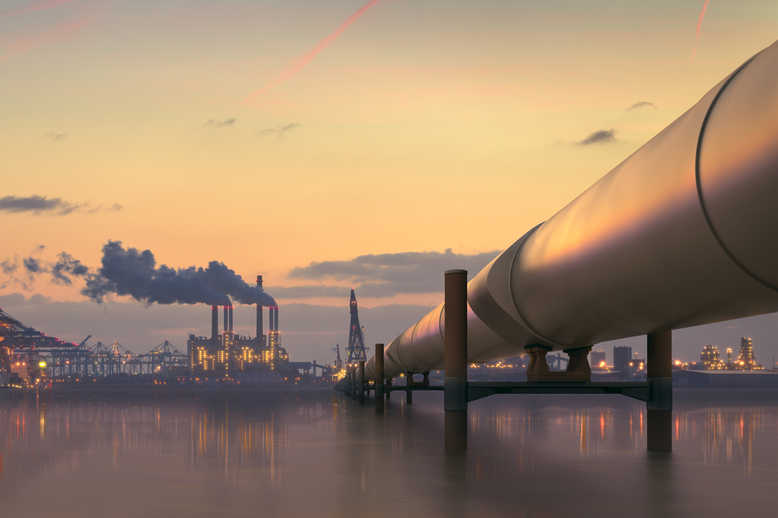Nord Stream 2: Russian Isolation of Ukraine?
July 19, 2018 | Expert Insights

Officials from Ukraine and Russia met in Berlin for EU-backed talks over the development of the Nord Stream 2 pipeline on 17 July. The European Commission hailed the talks as “positive.”
The new pipeline is expected to further isolate the Ukrainian economy from gas transports between Eurasia and Europe.
Background
Nord Stream AG, formerly known as North European Gas Pipeline Company, is a consortium for construction and operation of the Nord Stream submarine pipeline between Vyborg in Russia and Greifswald in Germany. The project was initiated by Chancellor Gerhard Schröder and President Vladimir Putin. The five shareholders of the consortium are Gazprom, Wintershall Holding(a BASF subsidiary), PEG Infrastruktur AG, N.V. Nederlandse Gasunie and ENGIE.
Nord Stream’s business model is to provide gas transportation for natural gas originating in western Russia, for distribution into the European gas grid. The gas transportation system comprises two 1,224-kilometre pipelines through the Baltic Sea. Each has the capacity to transport 27.5 billion cubic metres of natural gas a year.
A contractual framework is in place to ensure the transport of gas from the entry point of the Nord Stream pipelines in Vyborg, Russia to the exit point in Lubmin, Germany. In Germany, the gas is received by the connecting pipelines OPAL (Baltic Sea Pipeline Link) and NEL (North European Gas Pipeline) for further transport into the European grid.
Based on the EU Reference Scenario 2016, Europe’s gas demand is projected to remain mostly stable over the coming 20 years. At the same time, production will decline by about half, in Norway, UK and in the Netherlands. North African gas exports are expected to decrease, while gas from the Caspian region will be in limited supply. An approximate 120 bcm of European gas supply will have to be compensated by Russian gas. Thus, Nord Stream 2 was presented as a solution to close the import gap and increase security of supply.
Analysis
At the recent US-Russia Summit in Helsinki, Russian President Vladimir Putin reassured President Trump that Moscow wouuld keep the transit route of natural gas to Europe via Ukraine. Several EU countries and the European Commission fear that Nord Stream 2 would further boost Russia’s dominance on the European gas market. Although the US believes it will undermine Europe gas security, US officials have stated that sanctions on Russia will not affect Nord Stream 2 development.
Russia provides approximately a quarter of the natural gas consumed in the EU; approximately 80% of those exports travel through pipelines across Ukrainian soil before reaching EU.
Germany hosts destination ports of Nord Stream 1 and 2. However, the increased level of market concentration in Germany will negatively affect other markets, especially in Central and Eastern Europe. Moreover, Nord Stream 2 would make it easier for Gazprom to resort to discriminatory pricing and other anti-competitive practices, something it has done in the past, as proven by the European Commission’s antitrust investigation.
Ukraine fears the Baltic Sea pipeline, geographically bypassing the buffer state between Europe and Russia, will leave it politically isolated and deprived of crucial transit fees. Lengthy legal disputes between Russia and Ukraine’s energy companies have further complicated possible negotiations. Furthermore, dependence on Ukraine has reduced since Turkey inaugurated the Trans-Anatolian gas pipeline (TANAP) which will transfer Caspian gas to Europe.
Following the 2016 annexation of Crimea, it has been reported that the Russian government has backed pro-Russian rebels in Eastern Ukraine with arms and finance. Ukraine’s increasing affiliation with the EU and NATO threatened their role as a neutral buffer state. Isolation from emerging east-west connectivity could be one of the most enduring and damaging consequences of the war for Ukraine.
For both sides in the conflict, altering patterns of trade and transit is a means of shaping Ukraine’s political and economic destiny. While military forces have destroyed critical infrastructure, such as bridges and railways, the governments in Kiev and Moscow are building new connections that will re-orientate trade flows.
Assessment
Our assessment is that Europe can only reduce dependency on Russian gas, however, it cannot be entirely replaced by Central Asian gas imports. We believe that east European countries like Poland, Slovakia, Hungary or Romania will continue to rely on Ukrainian gas pipelines. We feel that by economically isolating Ukraine, Russia can influence the former’s alliance with the West.








Comments